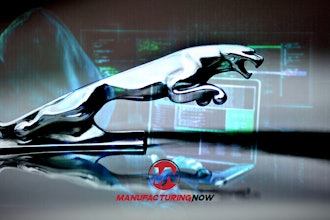Editor's Note, January 20, 2012: When Manufacturing.net first published this article, it mistakenly claimed that Sixing Liu pled guilty to exporting defense department data to China. He plead not guilty. The author, and the Manufacturing.net editorial staff, regret this error.
One word seems to be popular with all politicians -- from the right or left -- innovation. Everybody likes the idea of innovation and agrees that it is key to American competitiveness, if not the future.
China and other Asian countries already make most of our high volume commodity products, so America must compete by inventing new products, new technologies, and new industries. President Obama in his state of the union speech summed up our competitive challenge when he said, “The only durable strength we have, the only one that can withstand these gale winds, is innovation.”
America has always led the world in innovation, new products, and new technologies. In fact, inventing new technologies is as American as Jazz music, Western movies, and the Rocky Mountains. Everyone knows that new inventions and technologies can keep America in the manufacturing game. This includes the Chinese who are committed to acquiring our technologies any way they can. This is a much bigger threat than most people know because it not only threatens American manufacturing, but it is beginning to threaten our national security. U.S. technology espionage is a state-led effort that is a multi-level strategy including the following:
The FBI ranks China as one of the greatest potential espionage threats over the next decade. The FBI has performed four investigations into suspected Chinese espionage over the past 20 years (only one of which was prosecuted successfully) and has revealed the complexities of such cases. According to Nicholas Eftimiades author of the book “Chinese Intelligence Operations,“ Chinese espionage is focused on the theft of American technology.
A 1999 report to the congressional committee on U.S. National Security and Military Concerns warned that the People’s Republic of China (PRC) has stolen classified information on every thermo nuclear warhead in the Intercontinental Ballistic Missile (ICBM) arsenal. The U.S. Army War College says that China has gathered a lot of secret information on stealth technology, naval propulsion systems, electronic warfare systems, and nuclear weapons through espionage
An analysis of the U.S.Justice Department records by the Associated Press reveals that “there have been at least 58 defendants charged in Federal Court related to Chinese espionage since 2008.”
- A former B-2 bomber engineer Nosher Gowadia was found guilty of selling cruise missile technology to China.
- Mr. Kexue Huang pleaded guilty on espionage charges that he sold biotech trade secrets from Dow Chemical and Cargill Inc. to China.
- An employee of a New Jersey technology company, Sixing Liu is being prosecuted for exporting defense department data to China.
- Larry Wu-Tai Chin worked for the U.S. Intelligence community for 35 years. Chin sold highly classified National Intelligence estimates pertaining to intelligence agencies and their activities to China.
- The FBI recruited Katrina Leung to work in Chinese counter espionage. Leung had a two decade affair with special agent James Smith and became a double agent for China. She was able to copy documents on our nuclear and military issues carried by Agent Smith.
- Chi Mak, a Chinese born engineer who worked for L-3 Communications in California, was convicted of passing secrets on the Navy quiet drive propulsion technology through a courier to China.
- Peter Lee a Chinese born physicist for the Los Alamos nuclear weapons lab pleaded guilty to passing classified weapons technology and microwave submarine detection secrets to China for their nuclear development program.
- Ko-Sen “Bill” Moo was convicted in 2006 of being a covert agent of the People's Republic of China (PRC). He was arrested for trying to buy an F-16 jet engine, an AGM Cruise missile, Black Hawk helicopter engines, and AIM 120 air-to-air missiles to send to China.
Forced Technology Transfer
For the U.S. Manufacturers who have invested in building plants in China, there is continuous pressure, and a policy by the PRC, to force technology transfer in violation of international trade agreements. They do this by requiring the creation of joint venture companies as a condition to receiving access to Chinese markets. American companies often complain about forced technology transfer, but most of them give in because China has many ways of putting pressure on them.
Counterfeit Parts
In the early 1990s most of the parts purchased by the Defense Department were made in the U.S., Philippines, Hong Kong, and Singapore. We then made the mistake of allowing vendors to purchase commercial off the shelf parts (COTS) that met function and fit standards instead of mil spec standards. This led to many parts being made in China and the purposeful production of counterfeit parts. The August issue of Industry Week said, “In 2010, government agents seized fake goods totaling $188.1 million which if genuine would have been worth $1.4 billion. Goods from China accounted for 66% of the counterfeit goods.”
This is a real problem in microprocessors and other electronic parts that go into military systems because they could cause catastrophic failures in missile systems, helicopters, and aircraft. In November 2011, the Senate Armed Services Committee found that 1,800 cases of suspected counterfeit electronic parts have been investigated since 2009 and 70% of the parts came from China. This is now a national security issue
Cyber Spying
Cyberspace refers to the transfer of information via compact disks or email. It makes it possible to transfer enormous amounts of information instantaneously any where in the world. Examples abound of cyber espionage:
- David Yenb, an employee of Valspar, downloaded proprietary paint formulas valued at $20 million with the intent to sell them to China.
- Meng Dong, a DuPont Corp. research chemist, downloaded proprietary information on organic light emitting diodes with the intent of sending them to a Chinese University.
- Yu Xiang Dong, a product engineer with Ford Motors copied 4,000 Ford documents onto an external hard drive with the intent of transferring the data to an auto company in China.
- McAffe Company attributed an intrusion attempt by a company with a Chinese IP address to steal data from a computer system of a petro chemical company.
U.S. Intelligence agencies reported to Congress in November 2011 that both Russia and China steal technology information over the internet as a matter of national policy. The report says that cyber espionage has focused on communications technology, scarce natural resources, clean energy, health care systems, pharmaceuticals, military data (especially maritime systems), and air and space technologies.” This report is the collective assessment of 14 different agencies.
Chinese Investments
There is evidence that the Chinese want to invest in building plants in America because it is another way of gaining access to our technology. Chinese technology giant Huawai tried to buy a small computer company, 3 leaf, for that very reason. Fortunately, the Committee on Foreign Investment of the U.S. screened the purchase and rejected the proposal on the grounds it was neither fair nor transparent.
Tariffs, Regulations & Subsidies
Solar panels were invented in American the 1950s and many American companies have invested to take advantage of the need for alternative energy here and around the world. China also sees the demand and its central government want to take over the U.S. market. The tactic is to offer its producers huge subsidies, exporting all of its production, and dumping at low prices to gain market share.
China has also recognized that wind towers are a growing market all over the world and they have engaged in predatory pricing and subsidies to capture it. A complaint by a group of American Wind Tower manufacturers lists 40 subsidy and assistance programs ranging from cash grants and subsidized steel to tax breaks. The U.S. companies are asking for countervailing duties of up to 64% on their imported towers.[1]
Recently, the Chinese decided that America’s sports utility vehicles (SUVs) were being dumped on the Chinese market and they imposed a 22% tariff on all imported SUVs. The fact is that we sell very few SUVs in China. The Obama administration has formally complained about the tariff, but China’s Commerce Minister said it was a legal tariff and if “the U.S. thinks otherwise it should sue.” The response from our U.S. trade representative is that “they want to talk to Congress and industry officials on how best to respond.” It is these weak responses from multiple White House administrations that makes the Chinese thumb their nose at us, because they know there won’t be penalties.
National Security
The U.S. Office of the National Counterintelligence Executive issued a report that said, “China is driven by its long standing policy of catching up fast and surpassing Western powers. In terms of military technology, China is focused on two areas: marine systems designed to jump-start the development of blue water navy and aerospace systems that will allow China’s air force air supremacy.”[2]
In 2009, senior government officials said that Chinese spies infiltrated the electrical grid and left behind software that could be used for disruptions of the system
A study by Michael Weber of the University of Texas shows 13 of 16 manufacturing sectors that support America’s military arsenal suffered erosion because of off-shoring. Products like armor plate steel, integrated circuits, and night vision goggles are now obtained overseas. The dependence on foreign suppliers makes the nation vulnerable to shortages in emergencies. There is also the “danger that an overseas manufacturer could place a Trojan horse component with a virus or hard-to-detect flaw into critical equipments”.[3]
Conclusions
If innovation is the key to America’s future, and the only durable strength we have to compete, I wonder why more people aren’t worried. There are two fundamental problems with innovation and technology. First, there are many signs that our once commanding lead is slipping. Recent reports from the Boston Consulting Group based on hard data such as R&D spending, new patents, and venture funding; show that the U.S. has slipped from its number one position to eighth in the world.[4]
An even more ominous scenario is the fact that we are losing some of the technologies we have already developed because of espionage, counterfeiting, and outright theft. It doesn’t make very much sense to continue to invest in education, training, and R&D by filling the gas tank from the top, while the technology and innovation is leaking out a man-made hole in the bottom.
It is hard to say if China is still the red menace from the cold war, or if they have morphed into a new form of winner-take-all amoral version of capitalism. Regardless of how you define their system or policies, China does have a clear framework on how they view the U.S. and they are very focused and unified in their policies towards us. Make no mistake about it. China’s efforts to get our technology are a state-sponsored effort, and it is succeeding.
On the other hand, the U.S. can’t seem to get beyond our political bickering. We haven’t formulated a coherent policy on our trade problems with China. I think China views the U.S. as a weak nation that can’t get its political act together and is ripe for the taking. Why shouldn’t they continue with the same policies that have led to strong economic growth, as long as they are allowed?
It is becoming more obvious that we are indeed in a trade war with China, and we are losing. Innovation and technology are our only real advantage in our world wide struggle to stay on top as the leading economy. We have to find ways to capitalize on what we do best, and find better ways to protect our inventions from countries that will try to steal them any way possible. I think it is time to send a signal to China that we won’t be bullied and draw a line in the sand.
A good first test to China’s future intentions is to appeal to the World Trade Organization for sanctions because of currency manipulation, and then to add surcharges to imports. This might create enough leverage to get them to at least negotiate on their espionage activities.
Michael P. Collins is the author of the book Saving American Manufacturing. You can find more related articles on his website via www.mpcmgt.com.
[1] Dispute With China Escalates, The Oregonian December 30,2011
[2] Chinese Cyber-Espionage Growing: U.S. Report, Defense News, Wendell Minnick, Nov.6, 2011.
[3] Need a Towel Ring Better Try China, Global Economics, Bloomberg Business Week, May 9, 2011
[4] The Future of Innovation, Can America Keep Pace, Time Magazine, Fareed Fakaria, June 5, 2011.


















